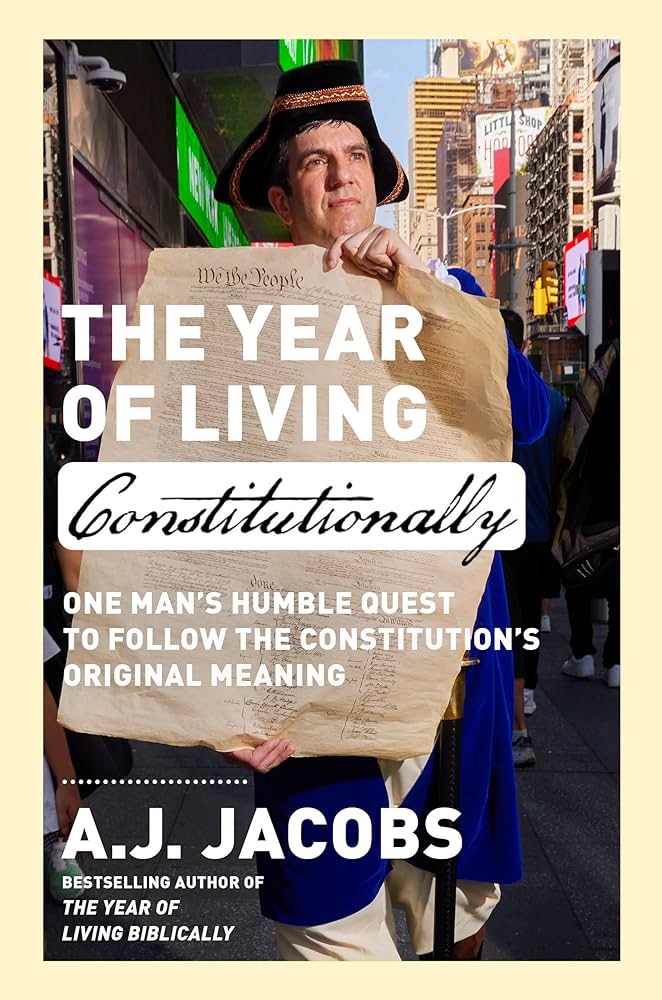
The Year of Living Constitutionally: One Man's Humble Quest to Follow the Constitution's Original Meaning
A.J. Jacobs
Questions & Answers
The author navigates the complexities of constitutional interpretation by adopting a multifaceted approach. He explores both originalism and living constitutionalism, acknowledging their strengths and weaknesses. He engages with legal scholars and experts from various political spectrums to understand different perspectives. The author also reflects on historical contexts, such as the founding era and the progression of amendments, to contextualize the Constitution's evolution. He emphasizes the importance of balancing original intent with contemporary values and societal needs, advocating for a nuanced interpretation that considers multiple factors, including history, tradition, and current morality. This approach allows him to critically analyze the implications of constitutional interpretation on modern society, highlighting the ongoing debate between adhering to the past and adapting to the present.
Adhering to an ultra-originalist interpretation of the Constitution could have significant consequences. It would likely restrict rights and freedoms as understood today, such as women's rights, LGBTQ+ rights, and privacy rights, as these were not considered in the original context. This could lead to laws that discriminate against women, restrict gun control, and limit freedom of speech. It would also impact the balance of power between federal and state governments, potentially reducing federal authority and increasing state control. Additionally, it could affect the interpretation of the Commerce Clause, potentially limiting federal regulation of businesses. Overall, an ultra-originalist approach could create a more restrictive and less inclusive society, with a government that is less responsive to contemporary needs and values.
The author's journey through the Constitution deeply influences his views on American history and the nation's founding principles. He acknowledges the Constitution's dual nature as both a document of oligarchy and liberation, reflecting the ongoing battle between these forces in American history. He emphasizes the importance of humility in interpreting the Constitution and the need to consider the perspectives of diverse groups, including women, people of color, and indigenous peoples. The author also highlights the struggle for equality and justice, noting the expansion of voting rights and the ongoing debate over the interpretation of the Constitution in relation to issues like women's rights, gay rights, and environmental regulations. His journey underscores the dynamic nature of the Constitution and its potential to evolve with the changing times.
The originalist approach emphasizes the Constitution's original meaning, providing stability and predictability. Its strengths include upholding the Founders' intent and maintaining the rule of law. However, it can be inflexible, potentially allowing for outdated and cruel practices, and may be inconsistent in its application.
The living constitutionalist approach adapts the Constitution to changing times, ensuring relevance and progress. Its strengths lie in its flexibility and responsiveness to societal changes. However, it can lead to arbitrary interpretations and undermine the rule of law if not properly constrained.
Both approaches contribute to the ongoing debate by highlighting the need for balance. The debate centers on whether to prioritize adherence to the Founders' intent or societal evolution, with each camp advocating for its respective interpretation of the Constitution's role in American governance.
The book's exploration of the Constitution offers several principles and lessons that can inform future discussions on governance, social justice, and American democracy:
-
Originalism vs. Living Constitution: The debate between originalism and living constitutionalism highlights the need for balance. Originalism emphasizes stability and adherence to the founding principles, while living constitutionalism adapts to changing times. Future discussions should seek a middle ground that respects the Constitution's original intent while allowing for necessary evolution.
-
Virtue and Public Responsibility: The Founders' emphasis on virtue and public responsibility suggests that citizens should prioritize the common good over individual interests. This principle can guide discussions on social justice, encouraging policies that promote the welfare of all members of society.
-
Flexibility and Adaptability: The Founders' willingness to change their minds and adapt to new information demonstrates the importance of flexibility in governance. Future discussions should embrace the idea that policies and laws must evolve to address contemporary challenges.
-
The Role of the States: The book's exploration of the balance between federal and state powers underscores the importance of states as laboratories for democracy. Future discussions should consider how state-level innovations can contribute to national policy.
-
Unwritten Rights: The recognition of unwritten rights, such as privacy and bodily autonomy, highlights the need for a nuanced understanding of the Constitution. Future discussions should explore the scope and implications of these rights in modern society.
-
Public Engagement: The Founders' vision of an informed and engaged citizenry emphasizes the importance of public participation in governance. Future discussions should focus on ways to increase civic engagement and ensure that all voices are heard.